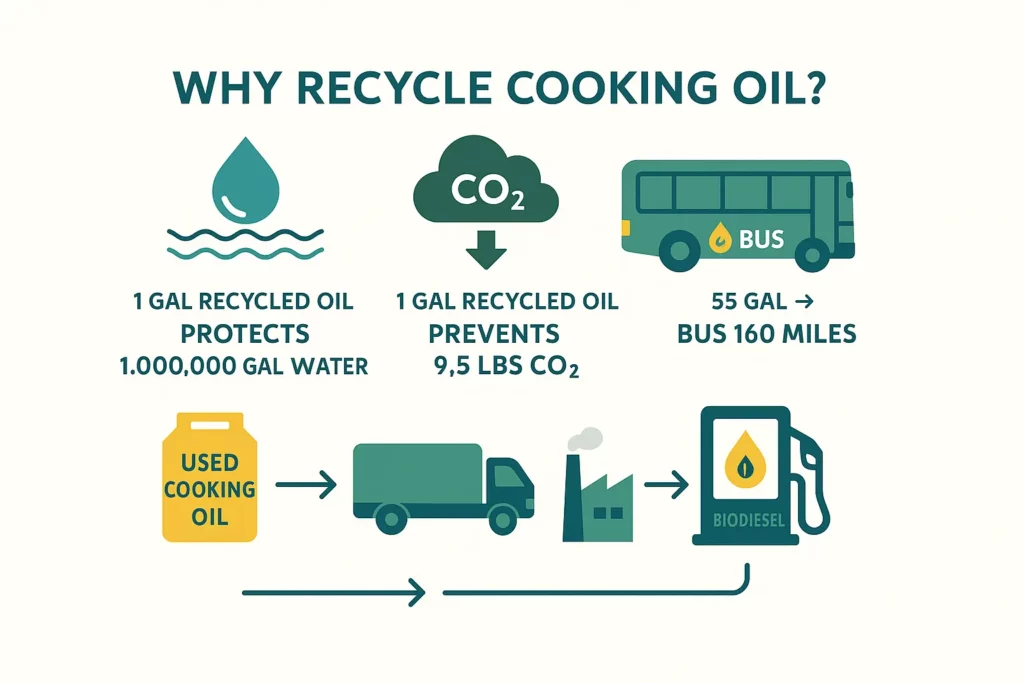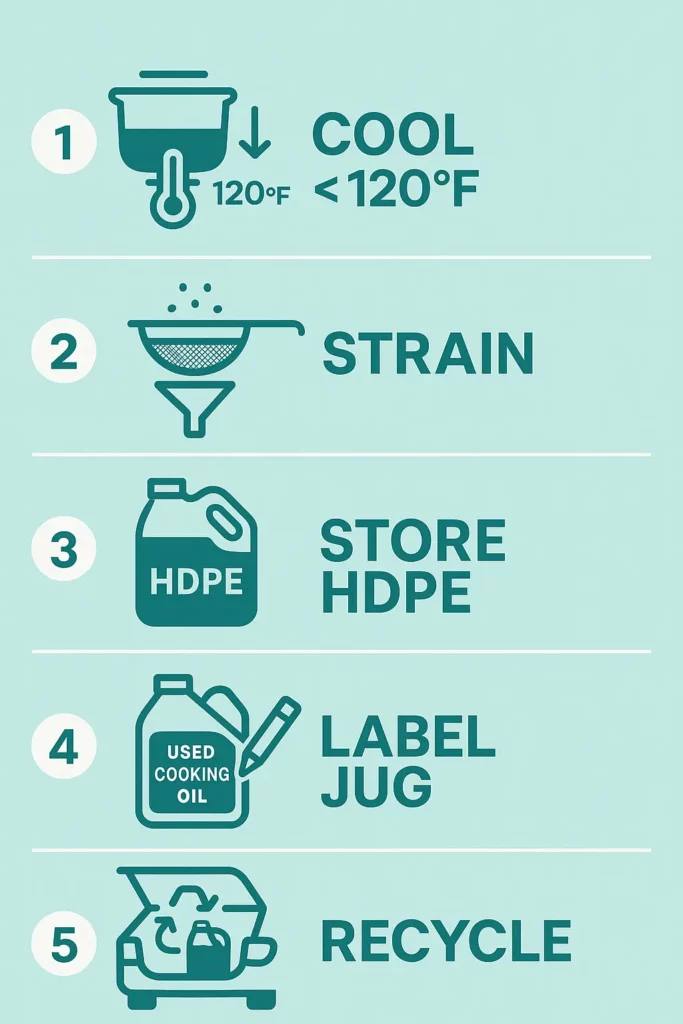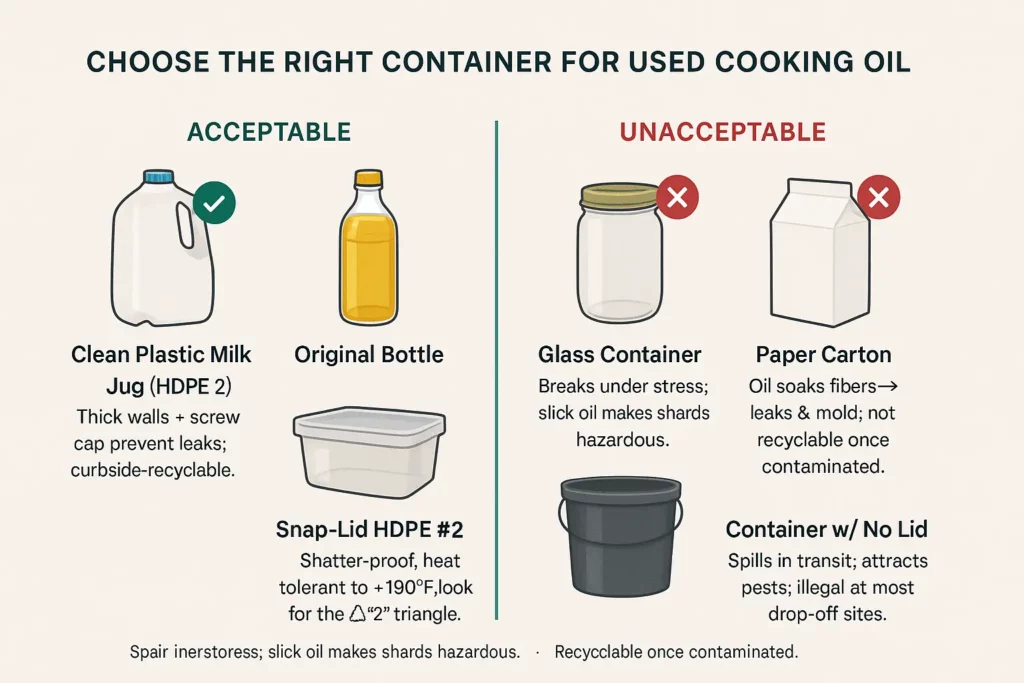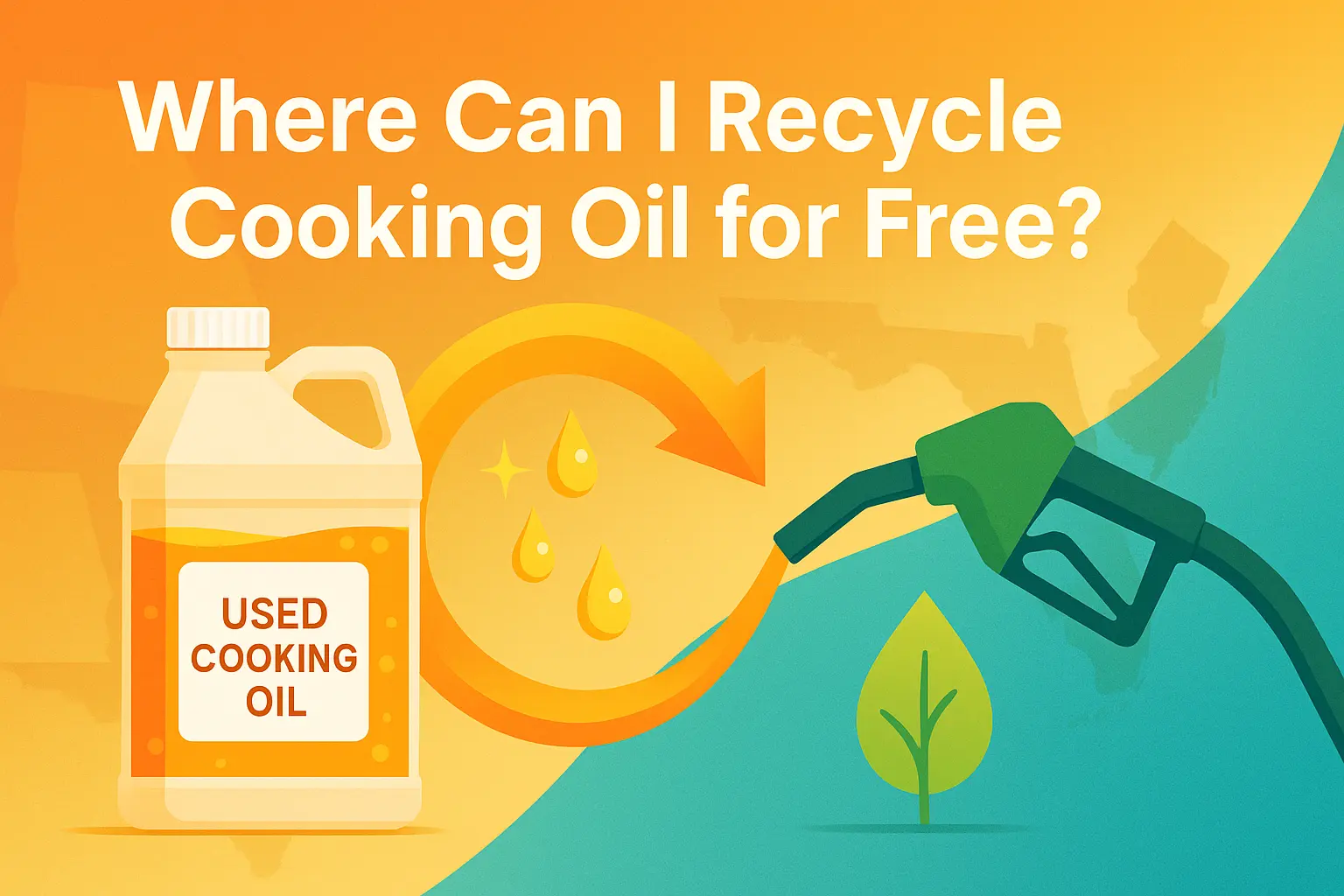Picture last night’s frying pan: the oil is cool, cloudy and begging to be dumped. Pause—because that leftover grease is worth far more than a clogged pipe or a hefty plumbing bill. In Georgia, Florida and New Jersey, dozens of drop-off spots will take it free of charge, spinning yesterday’s cooking oil into tomorrow’s low-carbon biodiesel. This guide pinpoints every no-cost location—from Athens’ CHaRM center to Tampa’s yellow CORE cabinets—while spelling out the simple rules for containers, volume limits and safe transport. Whether you’re a home chef with one quart or a restaurant that drains 50 gallons a week, you’ll find step-by-step prep tips, verified phone numbers and the environmental math that turns grease into clean miles on the road. Ready to keep waterways clear, cut carbon and save money in a single pour? Let’s dive in.
Why Recycle Cooking Oil?

Pouring cooking oil down a drain creates sewer “fatbergs.” A single gallon can contaminate 1 million gallons of water1, and U.S. utilities spend >$1 billion per year clearing grease blockages2. Homeowners face $300–$700 for every emergency clean-out.
Recycled, that same gallon becomes biodiesel or renewable diesel, cutting lifecycle CO₂ emissions by up to 86 %3—about 9.5 lb avoided per gallon4. A 55-gallon drum can power a city bus 160 miles5 while preventing 0.26 t CO₂. Counties reduce infrastructure costs, restaurants earn $0.10–$0.45 per gallon rebates6, and residents gain free, pipe-safe disposal. In short, oil recycling protects water, slashes carbon and delivers economic benefits.
- EPA Non-Point Source Outreach.
- WEF “Wipes, Fats, Oils & Grease” report.
- National Renewable Energy Lab biodiesel LCA.
Free Residential Recycling Options
Georgia (GA,US)
- Athens-Clarke CHaRM — 1005 College Ave, Athens, GA 30601 (Hours of Operation: Tues 7:00AM-1:00PM, Wen 12:00PM-6:00PM, Fri-Sat 7AM-1:00PM) Phone: 706-613-3501 — Website
- ACC Landfill — 5700 Lexington Rd, Athens, GA 30605 (Hours of Operation: Tues-Sat 7:30AM-4:30PM) Phone: 706-613-3508 — Website
- Live Thrive CHaRM Atlanta — 1110 Hill St SE, Atlanta, GA 30315 (Hours of Operation: Tues-Thur 9:00AM-2:00PM; Sat 8:00AM-2:00PM, appt.) 404-600-6386 — Website
Florida (FL,US)
- CORE – 78th St Library — 7625 Palm River Rd, Tampa, FL 33619 (Hours of Operation: Mon-Sat 10:00AM-6:00PM) Phone: 813-273-3652 — Website
- SWA HCRC (Jog Rd) — 6161 N Jog Rd, West Palm Beach, FL 33412 (Hours of Operation: Mon-Fri 7:00AM-5:00PM; Sat 7:00AM-3:00PM) Phone: 561-640-4000 — Website
- ECUA Perdido Landfill — 13009 Beulah Rd, Cantonment, FL 32533 (Hours of Operation: Mon-Fri 8:30AM-5:00PM) Phone: (850)-476-0480 — Website
New Jersey (NJ,US)
- Middlesex DPW “Cooking-Oil Bay” — 480 Ridge Rd, Dayton, NJ 08810 (Hours of Operation: Tue-Sat 8:00AM-2:00PM) (732)-745-4170 — Website
- Union County HHW — 1033 Springfield Ave, Cranford, NJ 07016 (Hours of Operation: 8:00AM-2:00PM) Phone: (908)-654-9889 — Website
- Essex Fleet Mgmt. — 99 W Bradford Ave, Cedar Grove, NJ 07009 (Hours of operation: 8:30AM-4:00PM) Phone: (973)-226-8500 ext. 2580 — Website
Always cool, filter and seal used cooking oil before drop-off.
Preparation: plastic jugs, tight caps; separate fats; no chemicals.
How to Prepare Cooking Oil for Recycling

Residential
- Cool oil below 120 °F.
- Filter crumbs with a fine mesh or coffee filter.
- Pour into a clean, screw-top HDPE container.
- Label “USED COOKING OIL.”
- Store upright in a shaded spot until drop-off.
Commercial Kitchens
- Drain fryers into a caddy or plumbed tank.
- Provide gloves & goggles for employee safety.
- Keep water out (1 % moisture cuts biodiesel yield 5 %).
- Log volumes; schedule pickup at 80 % capacity.
When You Don’t Have a Free Drop-Off Nearby: Four Practical Work-Arounds
Small-Batch Household Disposal (under 1 gallon)
If you only have a cup or two left after weekend frying, you can treat it like other solid household waste—but you need to immobilize it first. Pour the cooled oil into a disposable container, stir in an equal volume of unscented cat litter or oil-absorbing floor-dry, let it clump, then double-bag the mixture before placing it in your regular trash. Always confirm your city’s rules; some municipalities forbid liquids in landfills but allow solidified grease.
Community Collection Drives
Local schools, churches, or neighborhood associations can organize quarterly “grease drives.” Once they advertise a date and location, residents drop off sealed jugs. Commercial haulers typically waive their pickup fee when the event hits a volume threshold—about 100 gallons is common—because the oil becomes a profitable biodiesel feedstock.
Mail-Back Programs
Services like GreenDisk sell prepaid, leak-proof mailers. You fill the pouch (up to one quart per envelope), seal it, and hand it to your postal carrier. Current pricing is roughly $2 per quart, which covers both the container and shipping to a certified recycler—handy for apartment dwellers without a car.
Advocate for Permanent “CORE” Cabinets
Some counties install 24/7 drop-off kiosks—often called Cooking Oil Recycling Effort (CORE) cabinets—at public works yards or big-box parking lots. Hillsborough County, FL, for example, spent about $1,800 per cabinet, funded through storm-water fees. If your area lacks this infrastructure, rally neighbors and petition local officials; a few dozen signatures plus cost data can kick-start a pilot program.
Bottom line: Solidify small amounts, pool volumes through community drives, ship quarts by mail when convenient, and push for long-term drop-off sites so everyone has a truly free option, you can learn more here on how to properly dispose of used cooking oil.
Choose the Right Container for Used Cooking Oil

Preferred material:
- HDPE #2 or PET #1 plastic jugs (milk, water, or detergent bottles) resist heat, won’t shatter, and are accepted at nearly every drop-off site.
- Heavy-duty, food-grade poly buckets are fine for larger volumes if the lid screws on.
Size limits:
- Most residential programs cap containers at 5 gallons (≈19 L); bring multiple jugs instead of one oversize bin.
- Commercial kitchens should follow their hauler’s tote or tank requirements (25–80 gal minimums).
Closure type:
- Tight screw caps or threaded lids prevent leaks in the car and keep rainwater out of recycling tanks.
- Flip-top or snap-fit lids are risky—use them only if they lock firmly and can’t pop open in transit.
Avoid these containers:
- Glass: breaks easily and endangers staff.
- Unlined metal cans: can rust, contaminate oil, and spark during transport.
Label clearly:
- Mark each jug “USED COOKING OIL – NO WATER” with a waterproof marker.
- Add your name or phone if local rules require traceability.
Using the right container keeps your kitchen tidy, protects drop-off staff, and ensures every gallon of waste oil makes it safely to the biodiesel pipeline.
Environmental Impact Snapshot
| Oil Recycled | Water Protected | CO₂ Avoided | Diesel Equivalent |
|---|---|---|---|
| 1 gal | 1,000,000 gal | 9.5 lb | 0.9 gal |
| 55 gal | 55 M gal | 522 lb | 50 gal |
| 200 gal/yr | 200 M gal | 1 ton | 180 gal |
Sources: EPA water-pollution estimate; NREL biodiesel LCA (9.5 lb CO₂/gal); DOE diesel energy content.
Seasonal & Special Collection Events 2025
| Event (nofollow) | Date 2025 | Location | Notes | Contact |
|---|---|---|---|---|
| Gobble Grease Toss (GA) | 28 Nov | Redwood Co-op School, 166 Crestwood Dr, Lexington GA | Free funnels; turkey-fry safety tips | 706-769-2000 |
| Holiday Oil Drive (FL) | 22 Nov – 31 Dec | 1950 State Rd 419, Longwood FL | Any sealed jug; limit 10 gal | 407-665-2260 |
| Essex HHW Day (NJ) | 3 May & 4 Oct | 99 W Bradford Ave, Cedar Grove NJ | Bring ID; unlimited volume | 973-226-8500 |
Please verify dates with county websites before traveling.
Frequently Asked Questions
What kinds of cooking oil are accepted?
Vegetable, canola, peanut, corn, sunflower, olive and bacon grease are accepted; motor oil is not.
Is there a minimum volume to recycle?
Household sites take any amount up to posted limits; free commercial pickups start at 40–60 gallons per month.
Do I get paid for used cooking oil?
Restaurants can earn $0.10–$0.45 per gallon, depending on market rates; residential drop-offs are unpaid.
What happens after collection?
The oil is filtered, dewatered and converted into biodiesel or renewable diesel; residues become animal feed or boiler fuel.
Expert Advice
“Even 1 % water in a storage tank cuts biodiesel yield by 5 %. Keep lids tight and fittings clean.” — Dr. Maria Lopez, FOG Engineer, EPA Region 4 (EPA)
“Our indoor pump-over systems reduce slip-and-fall claims by 92 % and eliminate hot-oil hand-carrying.” — Crista Carrell, CEO, Clean Energy Biofuels (Source)
“Each CORE cabinet diverts about 2,000 gallons of waste oil yearly, protecting Tampa Bay estuaries.” — Danielle Lang, Manager, Hillsborough CORE (Source)
Conclusion
Free cooking oil recycling services are readily available in Georgia, Florida and New Jersey. Choose the nearest site, follow the cool-filter-seal steps and drop off your used cooking oil this week. Restaurants should schedule a no-cost pickup to earn rebates and keep grease traps clean. Every gallon recycled protects one million gallons of water, cuts CO₂ and transforms kitchen waste into clean fuel—simple actions that deliver big results.
- One gallon of oil can pollute 1 M gallons of water
https://www.epa.gov/nps/nonpoint-source-pollution-awareness-darby-duck-aquatic-crusader ↩︎ - Sewer “fatbergs” & >$1 billion annual utility cost
https://www.wef.org/resources/publications/books/wipes-fats-oils-and-grease/ ↩︎ - Biodiesel/renewable-diesel 86 % CO₂ reduction
https://www.nrel.gov/docs/fy21osti/79581.pdf ↩︎ - 9.5 lb CO₂ avoided per gallon of biodiesel
https://afdc.energy.gov/files/pdfs/greencarbon_lca_biodiesel.pdf ↩︎ - 55-gal drum → ~160 bus-miles (NREL duty-cycle study)
https://www.nrel.gov/docs/fy18osti/71948.pdf ↩︎ - Restaurant rebates ($0.10–$0.45 per gal) – Clean Energy Biofuels
https://cleanenergybiofuels.com/services/ ↩︎









